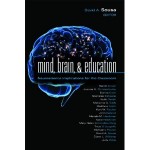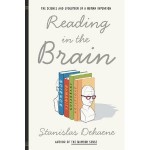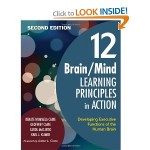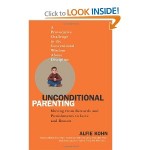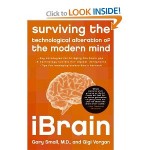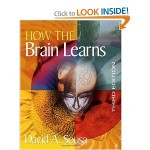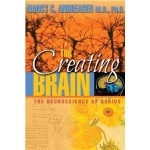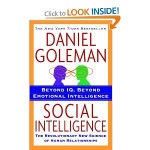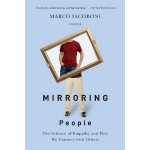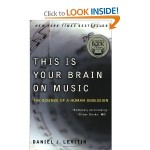The Top Brain Book Collection for Educators and Learners
 The powerful National Association for the Accreditation of Teacher Education (NCATE) has now issued a report that encourages pre-service and graduate teacher education programs to incorporate cognitive neuroscience discoveries about child and adolescent development into their curricula. This link to a Washington Post article on this development will also get you to the NCATE report.
The powerful National Association for the Accreditation of Teacher Education (NCATE) has now issued a report that encourages pre-service and graduate teacher education programs to incorporate cognitive neuroscience discoveries about child and adolescent development into their curricula. This link to a Washington Post article on this development will also get you to the NCATE report.
The next obvious step would turn encouragement into curricular/accreditation requirements. That incorporation of Educational Neuroscience discoveries into educational policy and practice will shape 21st century teacher education and K‑12 education in ways that are analogous to what folks such as John Dewey, B.F. Skinner, and Jean Piaget did to shape 20th century education.
I would argue that this current development isn’t overdue, but rather that it recognizes that Educational Neuroscience has now legitimately moved beyond speculation into a sufficient level of credible knowledge about what should and shouldn’t occur in K‑12 classrooms. The research and dissemination activity of many cognitive neuroscientists and visionary educators laid the groundwork for this important validating development during the last three decades.
At a very personal level, my final two books in a long career identify and explore the discoveries that the NCATE accredited programs will incorporate — The Adolescent Brain: Reaching for Autonomy (2007, Corwin Press) and A Child’s Brain: The Need for Nurture (2010, Corwin Press). Many other recent books by colleagues similarly present the kinds of current credible cognitive neuroscience information that teacher education faculties, K‑12 educators, and informed citizens will need.
I would especially recommend the following two dozen educationally significant recent books for general readers. Most were written by the cognitive neuroscientists who did the research that the books describe and interpret.
The first three books listed below are of special significance to both educators and general readers:
|
Sousa, D. (editor) (2010) Mind, brain, and education: Neuroscience implications for the classroom. Bloomington Indiana: Solution Tree.
|
|
|
Dehaene, S. (2009) Reading in the brain: The science and evolution of a human invention. New York: Penguin. Click Here to learn more and order.
|
|
|
Posner, M. and Rothbart, M. (2007) Educating the Human Brain. Washington DC: American Psychological Association.
|
.
The eight books below focus principally on educational issues:
|
Caine, R. and G., McClintic, C., and Klimek K. (2005) 12 brain/mind learning principles in action. Thousand Oaks Ca: Corwin Press.
|
|
|
Jensen, E. (2006) Enriching the brain: How to maximize every learner’s potential. San Francisco CA: Jossey-Bass.
|
|
|
Kohn, A. (2005) Unconditional parenting: Moving from rewards and punishments to love and reason. New York: Atria.
|
|
|
Ratey, J. with Hagerman, E. (2008) Spark: The Revolutionary New Science of Exercise and the Brain. New York: Little Brown.
|
|
|
Small, G. and Vorgan, G. (2008). iBrain: Surviving the technological alteration of the human mind. New York: Harper Collins.
|
|
|
Sousa, D. (2005) How the brain learns (3rd edition). Thousand Oaks CA: Corwin Press.
|
|
|
Stamm, J. (2007) Bright from the start: The simple, science-backed way to nurture your child’s developing mind from birth to three. New York: Gotham.
|
|
|
Wolf, P. (2010) Brain matters: Translating research into classroom practice. Alexandria VA. Association for Supervision and Curriculum Development.
|
The thirteen books below focus principally on brain/mind research and issues of general interest:
|
Andreasen, N. (2005) The creating brain: The neuroscience of genius. New York: Dana Press.
|
|
|
Boyd, B. (2009) On the origin of stories: Evolution, cognition, and fiction. Cambridge, Massachusetts: Belknap/Harvard Press.
|
|
|
Damasio, A. (2003) Looking for Spinoza: Joy, sorrow, and the feeling brain. New York: Harcocurt Brace.
|
|
|
Goldberg, E. (2005) The Paradox of Wisdom: How Your Mind Can Grow Stronger as Your Brain Grows Older. New York: Gotham Books.
|
|
|
Goleman, D. (2006) Social intelligence: The new science of human relationships. New York: Bantam.
|
|
|
Gopnik, A. (2010) The Philosophical Baby: What Children’s Minds Tell Us About Truth, Love, and the Meaning of Life. Picador.
|
|
|
Hawkins, J. and Blakeslee, S. (2004) On intelligence: How a new understanding of the brain will lead to the creation of truly intelligent machines. New York: Henry Holt.
|
|
|
Iacoboni, M. (2008) Mirroring people. The new science of how we connect with others. New York: Farrar, Strauss, and Giroux.
|
|
|
Johnson, S. (2005) Everything bad is good for you: How today’s popular culture is actually making us smarter. New York: Riverhead Books.
|
|
|
Kagan, J., Herschkowitz, N. and E. (2005) A young mind in a growing brain. Mahwah, NJ: Lawrence Erlbaum Associates.
|
|
|
Levitin, D. (2006). This is your brain on music: The science of an obsession. New York: Dutton.
|
|
|
Marcus, G. (2004) The birth of the mind: How a tiny number of genes creates the complexities of human thought. New York: Basic Books.
|
|
|
Pinker, S. (2007) The stuff of thought: Language as a window into human nature. New York: Viking.
|
 – Dr. Robert Sylwester is an Emeritus Professor of Education at the University of Oregon, the author of multiple books such as The Adolescent Brain: Reaching for Autonomy
– Dr. Robert Sylwester is an Emeritus Professor of Education at the University of Oregon, the author of multiple books such as The Adolescent Brain: Reaching for Autonomy (Corwin Press, 2007) and A Child’s Brain: The Need for Nurture (2010, Corwin Press) and many journal articles, and member of SharpBrains Scientific Advisory Board.

